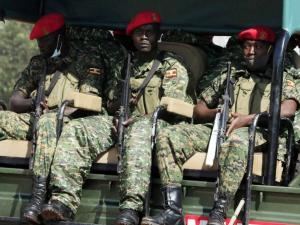
Military takes charge in Uganda as tensions rise ahead of polls
Uganda’s security agencies on Friday warned of firm action against any dissent ahead of and during this week’s election after the military took over law enforcement operations.
The country goes to the polls on Thursday to elect a president and members of parliament following a campaign marred by unprecedented violence in which at least 60 people have been killed in election-related violence, hundreds injured and more than 800 arrested.
Heavily armed security forces, including the army and military police, could be seen patrolling the capital Kampala and other towns, and have occupied several open spaces.
In December President Yoweri Museveni appointed Maj-Gen Paul Lokech, who earned the sobriquet “Lion of Mogadishu” for his exploits fighting against al Shabaab in Somalia, as the new deputy Inspector-General of Police. He replaced another army officer, Maj-Gen Sabiiti Muzeeyi. Recently, President Museveni — who has led Uganda since leading a rebel group to power in 1986, and is standing in his sixth election — appointed Maj. Gen. Kayanja Muhanga to co-ordinate joint security operations involving the police, military and intelligence agencies. Gen Muhanga has previously worked in counter-terrorism operations and also commanded Ugandan troops in the Africa Union Mission to Somalia.
President Museveni defended the military deployments during his New Year address and said they were to guard against violence he alleged is orchestrated by his political opponents. He said that he had deployed army units that have experience in urban warfare in Somalia because of “weakness and corruption” within the regular police force.
The opposition reject claims they are planning violence and say the military deployments are an attempt to intimidate voters and opposition supporters in order to suppress voter turnout and enable vote-rigging.
National Unity Platform party presidential flag bearer Robert Kyagulanyi Ssentamu aka Bobi Wine, who is seen as the leading opposition contender, on Wednesday night sent his children out of the country claiming they did not feel safe in Uganda.
“The regime has made it a deliberate plot to attack me, and when they don’t, attack those who are close to me so as to demoralise me,” he told reporters on Thursday. “There is nothing President Museveni is not ready to do in order to stay in power against the will of Ugandans.”
Protecting the vote
Despite three Supreme Court rulings that found electoral discrepancies that favoured the incumbent, President Museveni also used his New Year address to accuse the opposition of trying to rig the vote.
“I have information people are planning to steal elections, including election officials bribed to change results, or facilitate multiple voting. Then we have the ones who want to use violence to alter the wishes of the people,” he said. “I will not allow the affairs of the people of Uganda to be messed up by criminals and traitors who cheat.”
President Museveni appoints the electoral commissioners and other key officials at the polls body and late last year he fired the Commission’s secretary and spokesperson. Opposition supporters say the president’s vote-rigging claims are red herrings meant to deflect attention.
The two main opposition parties, FDC and NUP, say they will operate independent tally centres to collect and verify results from their agents across the country. This might be harder to execute, however, after the Chairperson of the Electoral Commission, Justice Simon Byabakama last week warned that cameras will not be allowed at the polling stations and that voters would also be required to leave after casting their ballots. He said this would prevent the spread of the coronavirus.
The law does not forbid cameras at polling stations and analysts have pointed out that the Electoral Commission’s own regulations, in fact, encourage voters to witness the counting and tallying of votes to improve transparency of the outcome.
Electoral Commission spokesman Paul Bukenya said political parties do not need to set up independent tally centres since they already have agents at polling stations and tally centres.
“The Electoral Commission is the body charged with ascertaining, tallying and announcing the final results. This is a reserve of the Commission,” he said. However, Ugandan law does not bar political parties from having parallel tally centres.
During the 2016 election, police raided the FDC tally centre, confiscated declaration forms and computers, and arrested some party officials. Although the party then claimed it had suffered electoral fraud, it was unable to gather evidence to challenge the official result in court.
NUP is hoping that a new digital application allowing agents to input results from polling stations into a cloud-based server using their mobile phones will help it avoid such analogue disruptions. With both FDC and NUP asking its voters to stay at polling stations to “protect their votes”, there could be run-ins with the police — and their heavily armed military back up.
